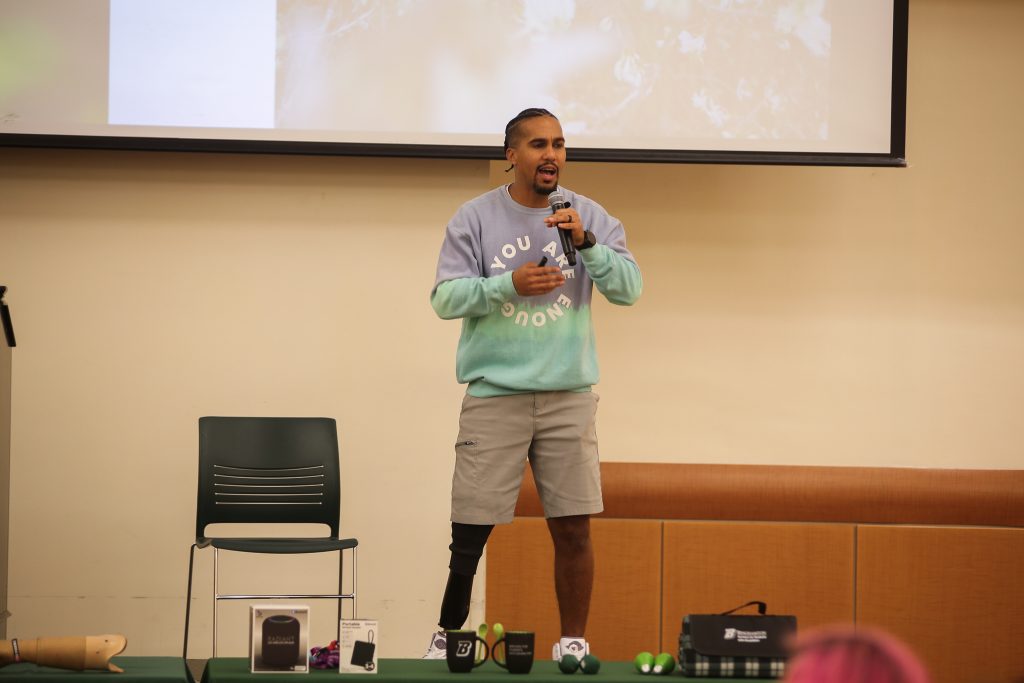As part of Services for Students with Disabilities’ Reframing Disabilities Week, Emmy-nominated motivational speaker and athlete Robert Anthony gave a talk this Tuesday.
Anthony was born with fibular hemimelia, a birth defect that led to the amputation of his lower leg. He is no stranger to adversity, having experienced a house fire that killed his grandmother and physical and sexual abuse at a young age. Anthony described the immense gratitude he has for his mother and aunt, who saved his prosthetic leg in the fire and worked multiple jobs to send him to private school.
“The reason why I choose to use my platform and my voice is because there may be someone here who’s going through what I’ve gone through, or who knows someone else who’s going through what I’m going through,” Anthony said. “So I choose to use my voice, to be a victor and not a victim, because I know that my voice is power.”
His desire to help others has taken on many forms, from music to acting to athletics. As a teenager, Anthony wanted to be a rapper — he saw himself as the “prosthetic-leg Tupac.” Anthony still enjoys the music, putting on a short rap performance during the talk. Still, he said he only really started to thrive after embracing his disability.
In 2019, Anthony helped produce an Emmy-nominated 17-minute short film about his life called “Able.” He has also appeared on multiple TV shows — including “America Ninja Warrior,” where he hopes to return and become the first amputee to climb the whirlpool. Anthony also has an upcoming show with actor Billy Crystal called “Winston,” set to air in January.
During the COVID-19 pandemic, Anthony struggled with depression while trying to homeschool his kids, keep his job and support his wife, who worked at a hospital. Anthony then described finding hope in the butterflies he saw outside, which he viewed as a transformative symbol, encouraging him to get back on his feet and pursue a new goal.
“I started to train for a triathlon, and I had this vision of me crossing the finish line with the USA kit, USA across my chest and my last name,” Anthony said.
He sought a triathlon training program and worked toward becoming an athlete, attending a qualifier where he placed well enough to earn a place on Team USA. He rose from unranked in 2022 to 16th in the world today.
Anthony also played for the world’s only all-amputee basketball team and traveled to schools to give motivational speeches. On one trip, they received a message from a 13-year-old girl who was failing school, struggling with her parents’ divorce and planned to commit suicide the next weekend. She said his speech inspired her not to give up and hoped the message could help her peers too. Anthony described this as the moment he realized he wanted to be a motivational speaker and advocate.
After producing the film, he was hired to work in the prosthetic industry for the company that made his first leg as a kid, Hanger Clinic. His work has taken him worldwide — from Haiti to the Philippines — raising money and awareness for amputees. Last month, he climbed a volcano in Ecuador to raise money for kids in need of prosthetics who cannot afford them.
In the future, Anthony will pursue advocacy in the United States, mentioning his work to get sports prosthetics, categorized as luxuries, covered by insurance. While eight states have addressed this issue so far, he plans to raise that number to 28 states by 2028.
Throughout his talk, Anthony highlighted the values of gratitude, intuition and perspective. He said he strives to see beyond his perception to a more global understanding and to trust his gut more, urging audience members to do the same.
“First and foremost, believe in yourself, take a deep breath, be in the moment and find gratitude,” Anthony said. “Find gratitude even in the things that you don’t have, or that you feel you may be missing out, because when you find yourself in a state of gratitude, that’s the gateway to grace.”
Kiana Fitzgerald, Anthony’s younger cousin and a senior majoring in philosophy, politics and law, attended the speech. She and Anthony have been close since childhood, with Anthony describing her as a “little sister.” He praised Fitzgerald’s support for his children during rough times, saying his daughter looks up to Fitzgerald and wants to attend Binghamton University.
“He’s one of the family members I’ve known [for the longest], and he’s helped me with almost everything, every obstacle I’ve ever had in life,” Fitzgerald said. “He’s super inspirational, as I’m sure you can tell — he always knows what to say, he’s just the light in our family’s life.”
Fitzgerald added that she hopes speeches like the one Anthony gave will reduce the stigma around physical and mental disabilities.
SSD will host other events this week, including a student panel where students with disabilities will share their experiences on campus, a workshop on electronic accessibility, goat yoga and a stop-and-go tabling event. Christen Szymanski, SSD’s director, said Reframing Disability Week will focus on shifting narratives around disability.
“[Disability] is not about being less than,” Szymanski said. “People with disabilities are large on campus, we’re over 10 percent of the student population, and in the country it’s 25 percent of the population. We want to take disability as identity and show people on campus, ‘hey, theres a lot of things that people with disabilities can do, maybe we shouldn’t think about all the things people with disabilities can’t do.”



